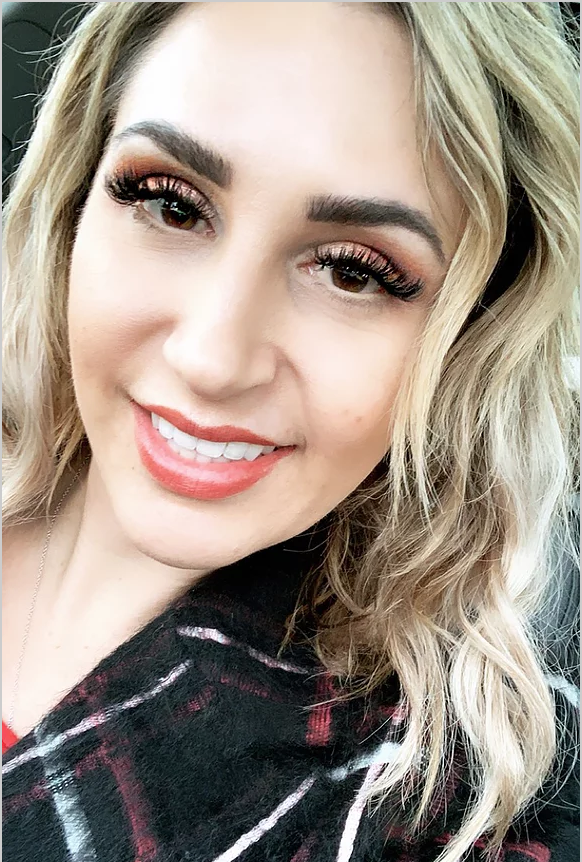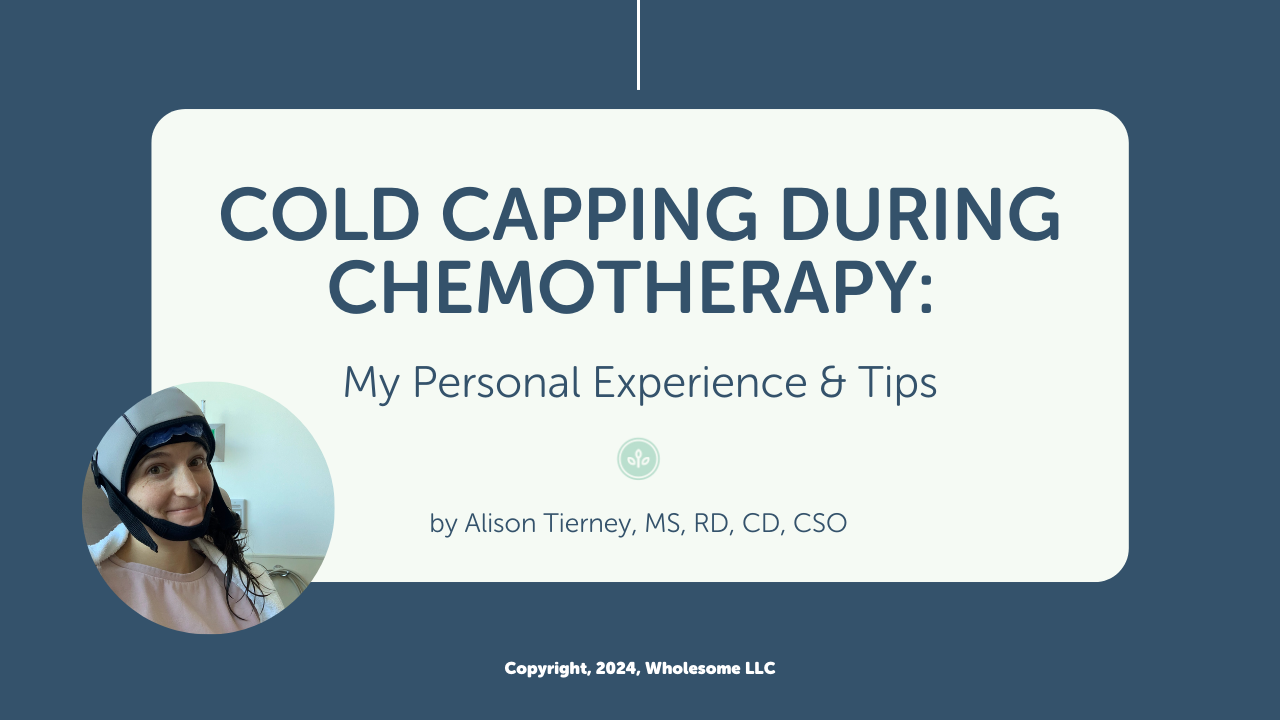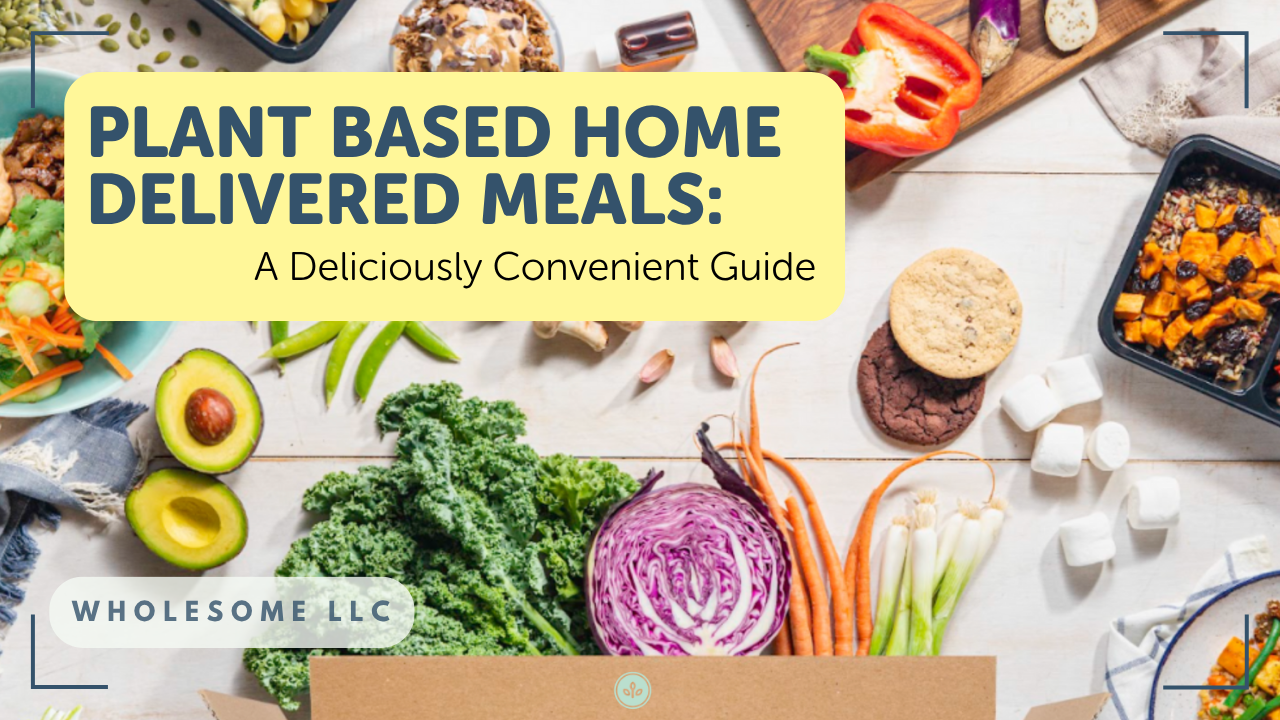The Wholesome Journey - Group Nutrition Coaching Program
Mentorship Program, 1:1 Nutrition Coaching with Alison
What do you want to learn more about?
Program Login
Podcast Features
January 1, 2019
Alison Tierney, MS, RD, CD, CSO
Alison is a registered dietitian, board-certified in oncology nutrition, and a cancer thriver. Her expertise in oncology nutrition and personal experience with her own cancer diagnosis and its treatment provide her with the unique perspective of being able to relate to her clients on an entirely different level. Her content is consistently focused on evidence-based guidelines and seeks to increase the awareness of the power of nutrition to complement traditional cancer therapies.
- Alison Tierney, MS, RD, CD, CSO
- Alison Tierney, MS, RD, CD, CSO
- Alison Tierney, MS, RD, CD, CSO
- Alison Tierney, MS, RD, CD, CSO
- Alison Tierney, MS, RD, CD, CSO
- Alison Tierney, MS, RD, CD, CSO
- Alison Tierney, MS, RD, CD, CSO
- Alison Tierney, MS, RD, CD, CSO
- Alison Tierney, MS, RD, CD, CSO
- Alison Tierney, MS, RD, CD, CSO
- Alison Tierney, MS, RD, CD, CSO
- Alison Tierney, MS, RD, CD, CSO
- Alison Tierney, MS, RD, CD, CSO
- Alison Tierney, MS, RD, CD, CSO
- Alison Tierney, MS, RD, CD, CSO
- Alison Tierney, MS, RD, CD, CSO
- Alison Tierney, MS, RD, CD, CSO
- Alison Tierney, MS, RD, CD, CSO
- Alison Tierney, MS, RD, CD, CSO
- Alison Tierney, MS, RD, CD, CSO
- Alison Tierney, MS, RD, CD, CSO
- Alison Tierney, MS, RD, CD, CSO
- Alison Tierney, MS, RD, CD, CSO
- Alison Tierney, MS, RD, CD, CSO
- Alison Tierney, MS, RD, CD, CSO
- Alison Tierney, MS, RD, CD, CSO
- Alison Tierney, MS, RD, CD, CSO
- Alison Tierney, MS, RD, CD, CSO
- Alison Tierney, MS, RD, CD, CSO
- Alison Tierney, MS, RD, CD, CSO
- Alison Tierney, MS, RD, CD, CSO
- Alison Tierney, MS, RD, CD, CSO
- Alison Tierney, MS, RD, CD, CSO
- Alison Tierney, MS, RD, CD, CSO
- Alison Tierney, MS, RD, CD, CSO
- Alison Tierney, MS, RD, CD, CSO
- Alison Tierney, MS, RD, CD, CSO
- Alison Tierney, MS, RD, CD, CSO
- Alison Tierney, MS, RD, CD, CSO
- Alison Tierney, MS, RD, CD, CSO
- Alison Tierney, MS, RD, CD, CSO
- Alison Tierney, MS, RD, CD, CSO
- Alison Tierney, MS, RD, CD, CSO
- Alison Tierney, MS, RD, CD, CSO
- Alison Tierney, MS, RD, CD, CSO
- Alison Tierney, MS, RD, CD, CSO
- Alison Tierney, MS, RD, CD, CSO
- Alison Tierney, MS, RD, CD, CSO
- Alison Tierney, MS, RD, CD, CSO
- Alison Tierney, MS, RD, CD, CSO
- Alison Tierney, MS, RD, CD, CSO
- Alison Tierney, MS, RD, CD, CSO
- Alison Tierney, MS, RD, CD, CSO
- Alison Tierney, MS, RD, CD, CSO
- Alison Tierney, MS, RD, CD, CSO
- Alison Tierney, MS, RD, CD, CSO
- Alison Tierney, MS, RD, CD, CSO
- Alison Tierney, MS, RD, CD, CSO
- Alison Tierney, MS, RD, CD, CSO
- Alison Tierney, MS, RD, CD, CSO
- Alison Tierney, MS, RD, CD, CSO
- Alison Tierney, MS, RD, CD, CSO
- Alison Tierney, MS, RD, CD, CSO
- Alison Tierney, MS, RD, CD, CSO
- Alison Tierney, MS, RD, CD, CSO
- Alison Tierney, MS, RD, CD, CSO
- Alison Tierney, MS, RD, CD, CSO
- Alison Tierney, MS, RD, CD, CSO
- Alison Tierney, MS, RD, CD, CSO
- Alison Tierney, MS, RD, CD, CSO
- Alison Tierney, MS, RD, CD, CSO
- Alison Tierney, MS, RD, CD, CSO
- Alison Tierney, MS, RD, CD, CSO
- Alison Tierney, MS, RD, CD, CSO
- Alison Tierney, MS, RD, CD, CSO
- Alison Tierney, MS, RD, CD, CSO
- Alison Tierney, MS, RD, CD, CSO
- Alison Tierney, MS, RD, CD, CSO
- Alison Tierney, MS, RD, CD, CSO
- Alison Tierney, MS, RD, CD, CSO
- Alison Tierney, MS, RD, CD, CSO
- Alison Tierney, MS, RD, CD, CSO
- Alison Tierney, MS, RD, CD, CSO
- Alison Tierney, MS, RD, CD, CSO
- Alison Tierney, MS, RD, CD, CSO
- Alison Tierney, MS, RD, CD, CSO
- Alison Tierney, MS, RD, CD, CSO
- Alison Tierney, MS, RD, CD, CSO
- Alison Tierney, MS, RD, CD, CSO
- Alison Tierney, MS, RD, CD, CSO
- Alison Tierney, MS, RD, CD, CSO
- Alison Tierney, MS, RD, CD, CSO
- Alison Tierney, MS, RD, CD, CSO
- Alison Tierney, MS, RD, CD, CSO
- Alison Tierney, MS, RD, CD, CSO
- Alison Tierney, MS, RD, CD, CSO
- Alison Tierney, MS, RD, CD, CSO
- Alison Tierney, MS, RD, CD, CSO
- Alison Tierney, MS, RD, CD, CSO
- Alison Tierney, MS, RD, CD, CSO
- Alison Tierney, MS, RD, CD, CSO
- Alison Tierney, MS, RD, CD, CSO
- Alison Tierney, MS, RD, CD, CSO
- Alison Tierney, MS, RD, CD, CSO
- Alison Tierney, MS, RD, CD, CSO
- Alison Tierney, MS, RD, CD, CSO
- Alison Tierney, MS, RD, CD, CSO
- Alison Tierney, MS, RD, CD, CSO
- Alison Tierney, MS, RD, CD, CSO
- Alison Tierney, MS, RD, CD, CSO
- Alison Tierney, MS, RD, CD, CSO
- Alison Tierney, MS, RD, CD, CSO
- Alison Tierney, MS, RD, CD, CSO
- Alison Tierney, MS, RD, CD, CSO
- Alison Tierney, MS, RD, CD, CSO
- Alison Tierney, MS, RD, CD, CSO
- Alison Tierney, MS, RD, CD, CSO
- Alison Tierney, MS, RD, CD, CSO
- Alison Tierney, MS, RD, CD, CSO
- Alison Tierney, MS, RD, CD, CSO
- Alison Tierney, MS, RD, CD, CSO
- Alison Tierney, MS, RD, CD, CSO
- Alison Tierney, MS, RD, CD, CSO
A few weeks ago, I wanted the perfect crunchy, dairy-free chocolate chip cookie. To put off my sweet craving, I opted for a healthier bowl of cereal.
What happened instead?
I ate the bowl of cereal + ate the cookie . . . okay, cookIES. Who can relate?!
Had I employed the natural, intuitive way of eating instead, I likely would have avoided the bowl of cereal + too many cookies. Luckily, my friend Kelli has taught me more about this mentality and I’m learning as I go. We thought there would be no better post on this New Year’s Day and no better person to write it than Kelli Dunham, MS, RD, CD from Mint Body Nutrition.
Scroll social media. You are bound to see posts about the keto diet, juice cleanses, detox tea, Atkin’s, Paleo and a million other diets.
Although many are completely different in their own ways, most diets have some common threads. They are extreme. Difficult to stick to long-term. Have a bunch of rules.
On top of that, did you know that 2/3 of people who diet will regain M O R E weight than they lost?! A team of UCLA researchers reviewed 31 long-term studies on dieting to conclude that dieting predicts weight gain, O V E R the original starting weight. (1)
It’s time we take a new approach to how we eat and ditch the diet mentality. Intuitive eating is a way of returning to our roots and learning to trust our bodies to regulate what we need as far as food.
Intuitive Eating is Natural

Have you ever thought about how a baby cries when it’s hungry and stops eating when it is full? It is natural or intuitive. The baby uses its hunger and fullness cues at the most basic level. Babies are born knowing exactly what they need. As we go through childhood, these cues can be lost quite easily due to influences from others, emotional eating, and diets.
- Did your mother or father ever tell you that you couldn’t leave the table until you “clean your plate”?
- Did your mother or father ever scold you for eating too many sweets?
- Did your mother or father ever not allow dessert unless all your food was finished?
- Did you ever go on a diet… or two or three?
- Have you ever “eaten your feelings”?
All these events can cause us to slowly lose our natural cues because we continue to eat when full, losing our signals of fullness. Restricting certain items like dessert or sweets can make hunger more uncontrollable.
What Happens When We Don’t Eat Intuitively?
Sometimes it can lead to weight loss or disordered eating. In many cases, weight gain is a result of not being cued into our bodies hunger and fullness signals.
Following a diet generally tends to pull us away from our natural hunger and fullness cues which is why they are often discouraged by nutrition experts such as registered dietitians.
Instead of dieting, an often used approach is moderation or balance. We can achieve this balance through intuitive eating. When we eat intuitively, the benefits are unlimited and it is in fact, evidence-based.
Research shows that intuitive eaters: (2, 3)
- Have a lower body mass index (BMI)
- Lower triglycerides
- Lower incidence of overeating or disordered eating
- Have higher self-esteem and well-being
- Have higher levels of HDL or “good” cholesterol
- Enjoy a wide variety of foods (more than non-intuitive eaters)
- TRUST THEMSELVES
Intuitive Eating Basics
The two most important things you can do to assure you are following your natural patterns of hunger and fullness is to T U N E into them. By learning more about your own hunger and fullness, you can become more intuitive as an eater.
First of all, intuitive eating thinks of hunger and fullness on a scale of 1-10. A 1 is absolutely starving while a 10 is beyond stuffed.

Give consideration to where you usually fall on this scale when you eat a meal. When we get “too hungry”, falling into 1-3, this easily may lead to overeating because we are overly hungry. The ideal time to eat is when your hunger rating is a 3-4.
To honor your hunger:
- Don’t ignore natural hunger signs (growling stomach, irritation, gnawing pain in the stomach)
- Keep your body fed with adequate energy and carbohydrates (carbs are the body’s primary & preferred source of energy!)
- Each time you eat, ask yourself – Am I hungry? What’s my hunger level?
The ideal place on the hunger scale to finish a meal is around a 7, or comfortably satisfied. To achieve this, it is important to eat consciously.
To feel your fullness:
- Pause in the middle of a meal and check in with your body
- Don’t feel obligated to leave food on your plate – or finish it all
- Eat without distraction

Intuitive eating also honors your health. In other words, while it may include a brownie because that is what you want, but it doesn’t include 7 brownies. While you follow your natural cues, also strive to eat a variety of foods including whole grains, fruits, vegetables, nuts, seeds, legumes and drink plenty of water. It is also important to get enough sleep, 7-9 hours per night for adults.
As mentioned earlier, moderation also comes into play – we are all human and will have treats too, like brownies. Paying attention to hunger and fullness means we can have balance and enjoy all foods while maintaining our health.
How to Eat More Intuitively
Begin by rating a meal, or two, each day to see where you fall on the hunger scale. Gauge your hunger prior to eating, then, gauge your fullness following the meal.
If you record a few days’ worth of meals, you will be able to find patterns and learn if certain times of the day or meals leave you unsatisfied or overly full. This helps you choose the foods that satisfy you most while considering your health.
Intuitive eating can help you to settle at your natural weight, where your body wants to be without dieting or restricting food.
To ditch the diet mentality:
- Eat when you are hungry
- Stop when you are satisfied
- Eat things that nourish your body and make you feel good
- Move your body
- Above all – TRUST YOURSELF!

About Kelli:
Kelli Kratt-Dunham MS, RD, CD has worked in the health and fitness industries for fifteen years as a personal trainer, coach, group exercise instructor and Registered Dietitian-Nutritionist.
She has helped clients with eating intuitively, weight loss, weight gain, eating disorder recovery, fitness & bodybuilding contest preparation, meal planning, grocery lists and more. In addition to private practice, Kelli works as an oncology dietitian with previous experience in eating disorder & mental health treatment and is currently pursuing a specialty board certification in oncology.
References:
- Mann, T, 2007. Medicare’s search for effective obesity treatments: diets are not the answer. Am. Psychologist. 62(3), 220-233.
- Augustus-Horvath & Tylka, 2011. The acceptance model of intuitive eating: A comparison of women in emerging adulthood, early adulthood, and middle adulthood. Journal of Counseling Psychology, 58, 110-125.
- Avalos & Tylka 2006. Exploring a model of intuitive eating with college women. Journal of Counseling Psychology, 53. 486-497.
Ditch the Diet Mentality: Intuitive Eating
Leave a Reply Cancel reply
Featured Articles
Wholesome LLC is not a medical practice, and its employees cannot offer medical advice. This website provides educational information but it is not a substitute for medical advice from a licensed medical professional who is familiar with your particular facts and circumstances. The information contained on this website is not intended to diagnose, treat, or cure any disease and shall not be construed as medical advice. The information and education on this website is provided for you to use at your own discretion.
You can further review our disclaimer here.
Wholesome
About Alison
Courses & Programs
The Wholesome Journey
Free Resources
FAQs
Press & Media
Recipes
Blog
Contact Us
Shop
© 2026 Wholesome, LLC All rights reserved.
Privacy Policy
Terms of Use
Disclaimer
Mobile Terms of Service



Be the first to comment